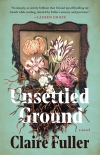Unsettled Ground, Claire Fuller [parable of the sower read online TXT] 📗

- Author: Claire Fuller
Book online «Unsettled Ground, Claire Fuller [parable of the sower read online TXT] 📗». Author Claire Fuller
In the middle of the night Jeanie wakes to the feather-like touch of something crawling over her face—a spider or another night-time insect—and she jumps out of the sleeping bag with a scream, madly brushing herself down and shaking out her hair. She recalls a radio programme about the insects that crawl or burrow into humans while they’re sleeping. In the morning she eats more carrots and as many radishes as she can manage before her mouth burns and she has to rush to the privy. Alastair is waiting for her at the bottom of the lane at eight thirty, his blazer hanging behind him on a hook which she didn’t know cars had. Jeanie sleeps while he drives and wakes in the hospital car park with saliva on her chin.
In the ITU Julius is paler, his cheeks more sunken. When Jeanie speaks to his nurse he says, “Julius had a bit of a rough night, but he’s doing as well as can be expected. Mr. Jones will be around this afternoon and you can have a chat with him.” But Alastair can’t stay for the afternoons and she doesn’t want to ask for a different driver who can. When Jeanie takes a break from sitting beside Julius, she goes again to the cafeteria and this time finishes the end of someone’s egg mayonnaise baguette and scrapes out the bottom of a pot of yoghurt. She has to check the picture on the lid to see that it’s supposed to taste of cherries.
Back at the cottage in the afternoon she takes the twin-tub out from the old dairy, as well as the trestles and the strips of coffin which Julius split for firewood, and piles it up in the yard. When the room is empty, she sweeps it, destroying any webs she can find and brushing away the spiders. It’s cleaner, but in the early morning the cold seeps up from the concrete floor and the air chills through the broken window, and her sleep is fitful with dreams that she can’t remember but leave her with an anxiousness she isn’t able to shake off. Her joints ache when she first stands up, her ankles so painful she is unsteady, and she goes slowly to the garden tap where she washes and brushes her teeth and rinses out her underwear. She eats a few raw vegetables to keep her going until she can get to the cafeteria. She worries that her clothes smell, that she smells.
In the hospital, Julius looks more gaunt and his skin has a yellowish tinge.
“I thought you were going to take his breathing tube out,” she says to a new nurse who has come on duty. The nurse smiles—a practised look of competence and sympathy.
“We tried to remove it yesterday afternoon, but Julius found it difficult to breathe on his own. We’ll try again in a day or so.”
“Is he going to be okay?” Jeanie knows it’s a stupid question, but she wants reassurance.
The nurse smiles again. “Why don’t you bring in a book and read to him? Patients often respond well to people talking to them.”
“I can’t read,” Jeanie says, and it comes out spitefully, bitterly, and they both know that she says it to make the nurse feel awkward.
Jeanie thinks she can see the nurse swallow back her retort, but whatever she was going to say is replaced with, “Just a chat then, about the weather, anything.”
Over the next few days Jeanie collects things from the caravan and carries them back to the old dairy a few at a time: more clothes and bedding, the radio which surprisingly wasn’t taken, saucepans and a frying pan, cutlery, all the tinned food that was left, and her guitar. In the afternoons she works amongst the vegetables and doesn’t go to Saffron’s; she doesn’t want to meet her because she doesn’t know what to say. In the evenings she builds a small fire near her mother’s grave, boils vegetables, and eats them with whatever she has gleaned from the hospital cafeteria. She thinks about Dot, and Jeanie’s new knowledge about her mother and Rawson becomes a slow downward drift of thoughts and emotions which settle into a sediment that she learns to live with. Only occasionally the silt is shaken, and fresh questions arise. How did they get messages to each other when Dot didn’t have a phone, and Caroline Rawson would have often been at home? How much did Dot tell Bridget? She wonders what music they played together and wishes that her mother had accepted Rawson’s help when she was ill. A new memory surfaces from five years ago or ten: Dot in a fluster, late for an appointment with the dentist, putting on lipstick in front of the small mirror which hung in the scullery. “Lipstick for the





Comments (0)